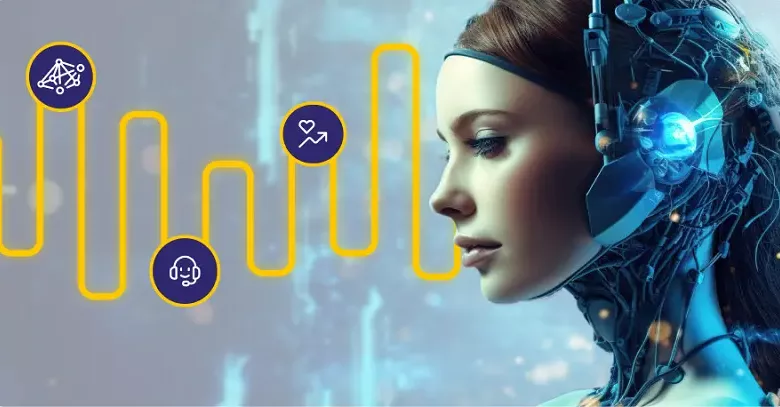How Generative AI Transforms Platform Architecture And Functionality?

Developers constantly seek innovative solutions to streamline the development process in the forever-evolving tech world.
One such revolutionary advancement is generative artificial intelligence (AI), a game-changer transforming AI platform architecture and functionality.
Let’s explore the impact of this tech on development practices, its benefits, and how it accelerates the creation of robust and efficient platforms.
The Rise Of Generative Artificial Intelligence
The generative type of AI is a subset of artificial intelligence designed to produce content or generate new ideas autonomously.
This technology has gained prominence for its ability to mimic human-like creativity and problem-solving.
Generative AI has emerged as a powerful tool in development, reshaping traditional approaches and paving the way for more efficient and dynamic platform architectures.
Enhanced Creativity In Design
One key way generative artificial intelligence transforms platform development is through enhanced creativity in design.
Developers can now leverage AI to generate innovative and visually appealing design elements, from user interfaces to entire platform layouts.
This expedites the design phase and introduces novel and aesthetically pleasing features that may have been challenging to conceive using traditional methods.
Automated Code Generation
Writing code is a fundamental development aspect and often requires meticulous attention to detail. This AI tech has revolutionized this process by introducing automated code generation.
Developers can now use AI algorithms to analyze patterns, understand coding best practices, and generate efficient code snippets.
This not only accelerates the coding process but also reduces the likelihood of errors, enhancing the overall reliability of the platform.
Personalized User Experiences
The generative type of AI is pivotal in creating personalized user experiences. By analyzing user behavior and preferences, AI algorithms can dynamically adjust the platform’s functionality and interface to cater to individual needs.
This level of personalization enhances user engagement and satisfaction, contributing to the platform’s overall success.
Faster Bug Detection and Resolution
Identifying and fixing bugs can be a time-consuming aspect of development. This cutting-edge tech transforms this process by enabling automated bug detection and resolution.
AI algorithms can analyze code, identify potential issues, and suggest solutions. This accelerates the debugging process and ensures a more robust and error-free platform.
Efficient Resource Utilization
Optimizing resource utilization is crucial for developing efficient platforms. Generative artificial intelligence analyzes usage patterns and resource requirements, allowing developers to optimize the allocation of resources more effectively.
This ensures the platform operates smoothly even under varying workloads, enhancing its scalability and performance.
Real-Time Adaptability
In today’s fast-paced technological landscape, platforms must adapt quickly to changing requirements.
Generative AI enables real-time adaptability by continuously learning and adjusting based on user interactions and feedback. This agility ensures the platform remains relevant and competitive in an ever-evolving market.
Benefits Of Generative Artificial Intelligence In Development
Incorporating generative artificial intelligence strategy in development practices brings about many benefits that contribute to the success of a platform. These benefits include:
- Time And Cost Savings: Automating various development tasks, from design to code generation, significantly reduces the time required to bring a platform to market. This, in turn, translates to cost savings, making development more efficient and cost-effective.
- Increased Innovation: The generative type fosters innovation by providing developers with the tools to explore new design concepts and functionalities. This encourages a culture of continuous improvement and creativity within development teams.
- Enhanced Quality: Automated bug detection and resolution, coupled with optimized resource utilization, contribute to the overall quality and reliability of the platform. Users can enjoy a seamless experience without the interruptions caused by common technical issues.
- Adaptive User Experiences: The ability to personalize user experiences based on individual preferences enhances user satisfaction and loyalty. The generative type of AI allows platforms to evolve and adapt to changing user expectations, staying ahead of the competition.
Read Also: Renewable Energy Integration Solutions for Businesses: Embracing Solar, Wind, and Beyond
Conclusion
Generative artificial intelligence is reshaping the landscape of platform development, offering developers powerful tools to streamline processes, enhance creativity, and deliver innovative solutions.
From automated code generation to personalized user experiences, the impact of this tech is far-reaching.
As we continue to embrace these advancements, the future of platform architecture and functionality appears more dynamic, efficient, and responsive than ever before.
Integrating the generative type of AI is not just a technological upgrade. It’s a paradigm shift that empowers developers to create platforms that resonate with users in today’s rapidly evolving digital era





